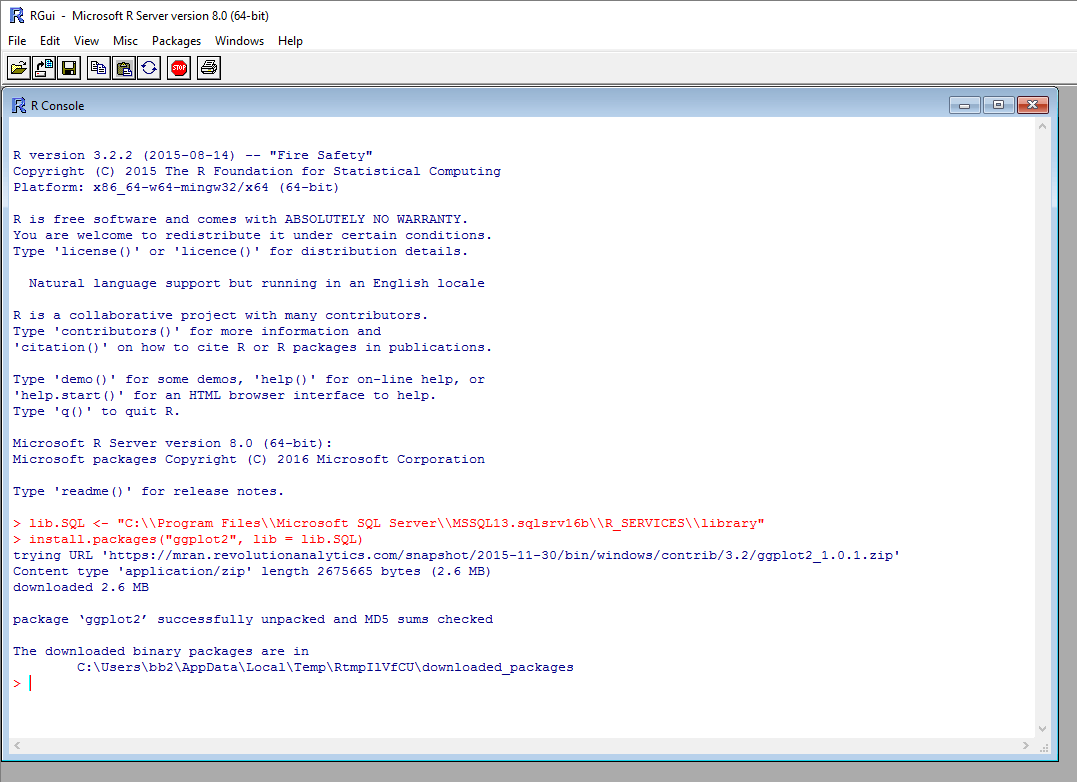I have installed R version R_2.14.1 on window and need to install some of the packages but my system does not have internet connection. Any idea of how to install R. Install packages from snapshots on the checkpoint. Without the use of an. Umbrella package with licenses and notices for all Microsoft R packages.

Suppose I need to install a number of packages on a (Linux) machine that does not have an internet connection. Let's say that I downloaded a copy of cran and burned it on a DVD that I bring to the offline location: wget ftp://cran.r-project.org/pub/R/src/contrib/*.tar.gz I can even add a PACKAGES file that contains an overview of all the source packages and their dependencies: library(tools) write_PACKAGES() How could I use this offline to install a source package in such a way that dependencies are resolved and installed from the local files as well? For example, someone wants to install package ggplot2, which has a fairly deep dependency structure. Assume the source package of ggplot2 and all of its dependencies are available as source packages in the current working directory. If I do: install.packages('ggplot2_0.9.1.tar.gz', repos=NULL) This results in an error, because the dependencies are not resolved at all. Alternatively: install.packages(list.files(pattern='*.tar.gz'), repos=NULL) However this also ignores the dependency structure, and tries to install packages in alphabetical order, which will also fail.
I looked into available.packages and contrib.url but I just can't find an example of installing a source package from a local file including it's dependencies. The correct answer was given by Joshua Ulrich in the comment on the question: The key is prefixing the argument to either repos or contriburl with file://. So in Unixy systems one could do: install.packages('ggplot2', contriburl='file:///path/to/packages/') This assumes that all required source packages, as well as a PACKAGES index file is available in /path/to/packages. If no PACKAGES file is present, this should be generated first using: library(tools) write_PACKAGES('/path/to/packages/') which will generate an index of all source packages found in this directory. Note that in the example, there are 3 slashes behind the file: prefix.
The third slash indicates a path relative to the root of the file system. The difference between the repos and contriburl argument is that repos will append another /src/contrib to the path specified, as this is usually where source packages are located on an official CRAN repository mirror.
Yes, you can download the packages from CRAN and install them from a file. If you look at a package's page on CRAN, most will have a Windows binary, a Mac binary, and the source available. Ni Razor Vst Crack on this page. Pick which one is best for you and put it on a thumb drive or something. You can then use install.packages('/path/to/package', repos = NULL). Note that you'll have to make sure you manually get all the dependencies as well.
This is going to be annoying, so if you have access to the computer already you'll be much better off just installing the packages now. As you note, the installing of dependencies can be very annoying.
The package you want has dependencies, and each dependency has dependencies ad infinitum! Goofball Goals Keygen Idm here. An easier way (especially if you won't have access to the internet for a while) is to simply clone CRAN to your laptop, so you have your own local copy. It's slightly over 100GB now, but that's no longer much by modern hard disc standards.
It's much easier that you might think. Just install a local copy of Apache web server, and rsync the CRAN FTP site to a directory on your hard disc that Apache is serving. Then in R, set the CRAN mirror to localhost. This is also really useful for performing analysis on servers with no public internet connection, to help protect your data. Edit: I just checked and you actually wouldn't need all that space. Just clone the binary (and source if you want it) folders for the version of CRAN you have installed. You'll be able to clone all the packages for a single operating system / single version of R using.